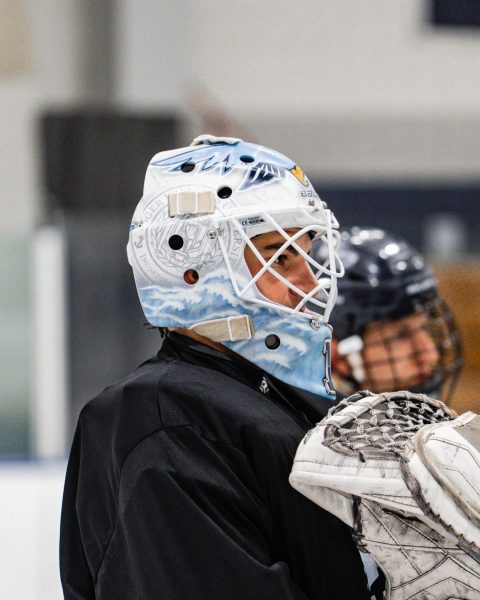Men’s Rugby is competitive, aggressive but mostly fun
The field is evenly matched — 15 people versus 15 people. The objective is to score more points than your opponent by placing the diamond-shaped ball in the try zone.
Rugby is a competitive game. The RWU men’s club rugby team practices during the week and participates in games on the weekends. According to senior Captain Vinny Neubert, the team practices about four times a week.
“We have practice as much as we can as long as we have field time and if it is weather is permitting,” Neubert said. “We try to work out together on Sundays and go to the pool and the sauna. On Wednesday when we have an off day, we try to get an hour of work together in the gym, whether it is conditioning or lifting just to stay in shape and be on our best game.”
Neubert has been playing rugby for the past three years. He said he is still learning about the game as he plays.
One of the basic rules of rugby involves not being allowed to pass the ball forward. Players can only pass the ball backwards and have their teammates run the ball forward.
The name of a point in rugby is called a try. One try is equal to five points. After a team has scored a try, they can go for something similar to a field goal, called a conversion. The team who scored is able to attempt to kick the ball through the cross bars to receive two more points.
If the ball goes out of bounds during a game, the team can perform a line-out or a scrum. These are both methods of getting possession of the ball.
A line-out occurs when a player from each team is lifted into the air in order to receive or intercept the ball being thrown in. The objective is to throw the ball high to get it over their opponents, so one of their teammates can catch it. Their teammates and the opposing team are lifted into the air in order to try to get an advantage to either catch or intercept the ball coming in.
The other option is a scrum, which is where the ball is thrown in between each team while they are crouched over with their arms wrapped around one another. They begin to push against one another once the ball is thrown underneath them. Whichever team moves fully over the ball first receives possession.
Since rugby is an aggressive game with tons of physical contact, the team always wears mouth guards. Junior Sam Quaye said he also prefers to wear some padding.
“Most of us wear an undershirt that is typically for football, but I wear one underneath my jersey,” Quaye said. “We use them in rugby and they have thin padding for shoulders and ribs… we all wear mouth guards.”
Quaye also discussed how learning the correct way to tackle in rugby is extremely important for safety reasons.
“We have to learn how to tackle in the correct way,” Quaye said. “You see that now in football, they are having trouble because people go flying around so learning how to play correctly makes the game a lot safer.”
Neubert also spoke about the importance of tackling correctly.
“You cannot tackle above the shoulders. You are only allowed to tackle below the waist. If you tackle anywhere above the waist, you will get carded,” Neubert said. “We make sure when we are tackling that we are low and that our heads are in the right position.”
Everything that the teams wear, whether it is a mouth guard, padding or cleats, has to get rugby certified.
Neubert said you can wear soccer or lacrosse cleats, describing what players usually wear on the field.
“The cleats cannot have toe spikes because you could step on somebody and that could be dangerous,” Neubert said. “Metal spikes cannot be pointed, they have to be rounded,. We have to wear our uniforms, players can choose their cleats and if they want to wear padding. Honestly, people can choose to wear a mouth guard. Usually everyone wears a mouth guard, some people decide not too. I wear a mouth guard.”
When Quaye and Neubert were originally coming to college, both were looking to play other sports. They discovered rugby in a similar way.
“I came here initially for soccer and then I got cut,” Quaye said. “The day of the club fair, I was walking around… I knew two of the players from the Rugby team who were sitting by the table… they were from back home and convinced me to play. As soon as I went out to play, it was a lot of fun. So, I just fell in love with it.”
Neubert described a similar experience.
“A few graduates from my high school that I played softball with asked me what I wanted to do in college. I said I wanted to play football… ‘If you don’t end up playing football, you should definitely try rugby,’ my friends said. My freshman year I came here, I met a couple friends from my dorm… asked them if they wanted to try rugby with me and that’s all she wrote,” Neubert said.
Quaye and Neubert highly encourage others to try out the sport.
“Do it. Just do it. It is the perfect way to let out stress, the perfect way to just have fun. To me it is the all-around perfect sport and I’m so happy I gave it a try,” Quaye said. “I tell everyone to try it. Worse comes to worse you don’t like it and you stop playing but at least try it. It is not a sport people grow up with. There are a few players here who played throughout high school, but I know for me I hadn’t even heard about the sport until I got here. It is worth a try, even if the person decides to stick with it or not.”
Neubert said the only way a person will truly learn about rugby is if they play.
“I think the biggest part about learning rugby is playing the sport. You can’t just watch it. You should come and play, learn about the basics… if you want to play rugby, please come out and try it this semester to see if you like it,” Neubert said. “It honestly might be one of the best decisions of your life.”






